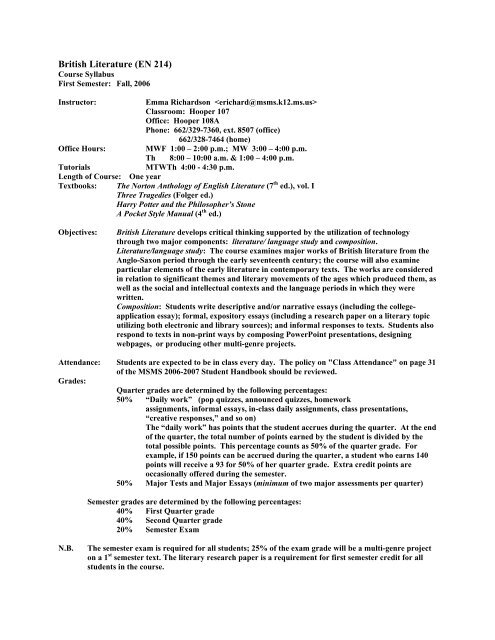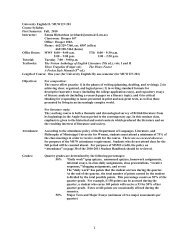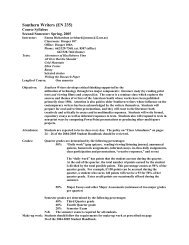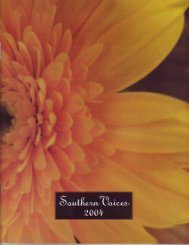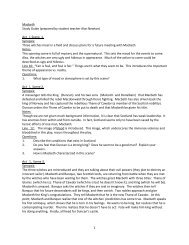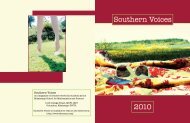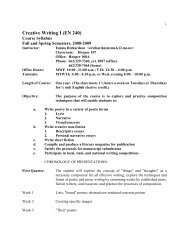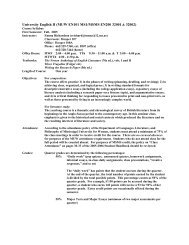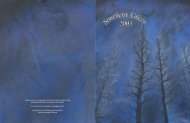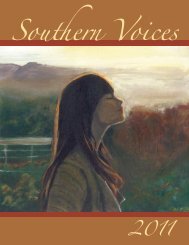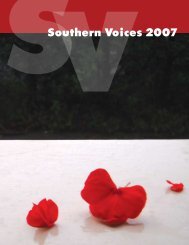British Literature (EN 214)
British Literature (EN 214)
British Literature (EN 214)
Create successful ePaper yourself
Turn your PDF publications into a flip-book with our unique Google optimized e-Paper software.
<strong>British</strong> <strong>Literature</strong> (<strong>EN</strong> <strong>214</strong>)<br />
Course Syllabus<br />
First Semester: Fall, 2006<br />
Instructor:<br />
Office Hours:<br />
Tutorials<br />
Length of Course: One year<br />
Textbooks:<br />
Emma Richardson <br />
Classroom: Hooper 107<br />
Office: Hooper 108A<br />
Phone: 662/329-7360, ext. 8507 (office)<br />
662/328-7464 (home)<br />
MWF 1:00 – 2:00 p.m.; MW 3:00 – 4:00 p.m.<br />
Th 8:00 – 10:00 a.m. & 1:00 – 4:00 p.m.<br />
MTWTh 4:00 - 4:30 p.m.<br />
The Norton Anthology of English <strong>Literature</strong> (7 th ed.), vol. I<br />
Three Tragedies (Folger ed.)<br />
Harry Potter and the Philosopher’s Stone<br />
A Pocket Style Manual (4 th ed.)<br />
Objectives:<br />
<strong>British</strong> <strong>Literature</strong> develops critical thinking supported by the utilization of technology<br />
through two major components: literature/ language study and composition.<br />
<strong>Literature</strong>/language study: The course examines major works of <strong>British</strong> literature from the<br />
Anglo-Saxon period through the early seventeenth century; the course will also examine<br />
particular elements of the early literature in contemporary texts. The works are considered<br />
in relation to significant themes and literary movements of the ages which produced them, as<br />
well as the social and intellectual contexts and the language periods in which they were<br />
written.<br />
Composition: Students write descriptive and/or narrative essays (including the collegeapplication<br />
essay); formal, expository essays (including a research paper on a literary topic<br />
utilizing both electronic and library sources); and informal responses to texts. Students also<br />
respond to texts in non-print ways by composing PowerPoint presentations, designing<br />
webpages, or producing other multi-genre projects.<br />
Attendance: Students are expected to be in class every day. The policy on "Class Attendance" on page 31<br />
of the MSMS 2006-2007 Student Handbook should be reviewed.<br />
Grades:<br />
Quarter grades are determined by the following percentages:<br />
50% “Daily work” (pop quizzes, announced quizzes, homework<br />
assignments, informal essays, in-class daily assignments, class presentations,<br />
“creative responses,” and so on)<br />
The “daily work” has points that the student accrues during the quarter. At the end<br />
of the quarter, the total number of points earned by the student is divided by the<br />
total possible points. This percentage counts as 50% of the quarter grade. For<br />
example, if 150 points can be accrued during the quarter, a student who earns 140<br />
points will receive a 93 for 50% of her quarter grade. Extra credit points are<br />
occasionally offered during the semester.<br />
50% Major Tests and Major Essays (minimum of two major assessments per quarter)<br />
Semester grades are determined by the following percentages:<br />
40% First Quarter grade<br />
40% Second Quarter grade<br />
20% Semester Exam<br />
N.B.<br />
The semester exam is required for all students; 25% of the exam grade will be a multi-genre project<br />
on a 1 st semester text. The literary research paper is a requirement for first semester credit for all<br />
students in the course.
Reading:<br />
Make-up work:<br />
Academic Honesty:<br />
In order to participate fully in each class session, students must have read all assigned<br />
material prior to class. Readings for each day are included in this syllabus. In addition to<br />
the assigned literature, students should also read the introductory essay to each author. It<br />
is expected that students will participate in class discussions.<br />
Students should follow the requirements for make-up work as prescribed on page<br />
47 of the MSMS 2006-2007 Student Handbook.<br />
Students are expected to be academically honest. That means the work you do should be<br />
your own work. By all means study together, discuss reading assignments together, and<br />
even discuss “strategies” for approaching written assignments together if you need to.<br />
But when it comes time to committing something to paper, do not consult another<br />
student’s work. Do not allow another student to read any of your written assignments<br />
before you hand them in. If another student’s paper reflects your own work, your own<br />
work will be called into question. Academic dishonesty will not be tolerated.<br />
True confession: I have a near-photographic memory for “words on the page.”<br />
I’ll explain this in class.<br />
Read the section on “Academic Honesty” on page 28 in the MSMS 2006-2007 Student<br />
Handbook. Also, read Section 29, “Avoiding Plagiarism,” in A Pocket Style Manual<br />
found on pages 115-118 of that text.<br />
If you have any questions regarding plagiarism or “academic honesty,” you need to<br />
ask them by the end of the first week of class. Consequences for academic dishonesty<br />
at MSMS are prescribed on page 119 of the MSMS 2006-2007 Student Handbook.<br />
My high school English teacher used to say that using as many as three words in the<br />
same order from another person’s work without sufficient attribution and documentation<br />
constitutes plagiarism. That is probably a good thing to keep in mind. Additionally, you<br />
must provide a reference for any idea you borrow from a source.<br />
If you consult any reference “help” in order to write papers (from The Internet<br />
or other sources), you need to acknowledge that reference as you would in a<br />
research paper. This includes Cliff’s Notes, Spark Notes, Wikipedia, and the like.<br />
(Consult A Pocket Style Manual for appropriate MLA documentation style.)<br />
A word to the wise: The technology that makes it easy for dishonest students to find<br />
papers/information in cyberspace that they pass off as their own work also makes it easy<br />
for someone grading papers to locate the sources.<br />
(Syllabus distributed to students on 4 August 2006.)
Schedule of Assignments:<br />
(Please note that assignments may be altered or added during class to the ones<br />
below; be sure to contact a reliable classmate or the instructor if you miss class.)<br />
Page numbers for the Norton ("NA") readings appear in parentheses after titles;<br />
unless otherwise indicated, the entire selection should be read, as should the<br />
biographical introductions to authors (where applicable).<br />
August<br />
Fri 4 Course introduction: Syllabus and course assignments, course<br />
overview, attendance, tutorials, evaluation/grades, letters of<br />
recommendation, due dates for assignments, pop quizzes (a.k.a. "little<br />
opportunities"), academic honesty, essays, the research paper, textbooks<br />
issued, "how to succeed in this class"<br />
Mon 7<br />
Wed 9<br />
Handout: "The History of English"<br />
NA(I): "The Middle Ages to ca. 1485" (1-6)<br />
Also: The research paper--considering texts and topics<br />
Presentation: The History of English<br />
Fri 11 Presentation: The History of English<br />
Mon 14<br />
Wed 16<br />
Major Quiz (on The History of English)<br />
Booklet: The Pizazz Factor: Writing Successful College-Application<br />
Essays (Read pages 1-10)<br />
Handout: "Tips for Writing Effective Essays"<br />
N.B.: Bring with you to class today any college applications that have<br />
assigned essay topics. (If you don't have any authentic topics, you'll be<br />
provided with some in class!)<br />
Fri 18 The Pizazz Factor (Read pages 11-18)<br />
Continue discussion of college-application essays<br />
Mon 21<br />
Wed 23<br />
Complete discussion of college-application essays<br />
Due Today: First page (or so) of college-application essay<br />
(The "finished product" will be 500-600 words and is due on<br />
Friday, September 1 st .)<br />
Also: Introduction to Anglo-Saxon lyric poetry<br />
Fri 25 NA (I): "The Wanderer" (99-102) [N.B. Prose translation]
Handout: "The Wanderer" [N.B. Poetic translation]<br />
August<br />
Mon 28<br />
Wed 30<br />
Continue discussion of "The Wanderer"<br />
Writing Review: Re-read pages entitled "Essays" in back of<br />
syllabus before coming to class. Bring A Pocket Style Manual textbook to<br />
class today. Ask about the little written assignment due on September<br />
11 th .<br />
Also: Have you chosen your research paper primary text<br />
September<br />
Fri 1 Due Today: College-Application essay (500-600 words); counts<br />
as a major test grade) Be prepared to read essays aloud in class. (If<br />
you are a National Merit Semi-finalist, you may use the National<br />
Merit topic to write the essay for this class.)<br />
Introduction to Beowulf<br />
Mon 4 Holiday! (Labor Day)<br />
Wed 6 NA (I): Beowulf (29-60)<br />
Fri 8 NA(I): Beowulf (60-99)<br />
Mon 11 Complete Beowulf<br />
Due Today: Thesis statements and intro. paragraphs<br />
Wed 13 Major Test (on Anglo-Saxon lyric and epic poetry)<br />
Fri 15 The Hero's Journey (video text)<br />
Mon 18 J.K. Rowling<br />
Harry Potter and the Philosopher’s Stone<br />
Ask about the major essay due on Sept. 29 th .<br />
Wed 20 Continue discussion of Harry Potter<br />
Due Today: The Research Paper's Primary Text and four (4) secondary<br />
sources (e.g. books, photocopied articles from books, articles from<br />
journals [either online or print journals]).<br />
You must bring the “physical copy” of the primary text to class today as<br />
well as physical copies of four secondary sources. In addition, you must
ing a brief précis for each source with a bibliographic entry (using MLA<br />
style requirements) at the top of the page for each entry (I’ll explain this<br />
further in class). You will be asked at the beginning of class to respond in<br />
writing to a few questions about that text and those sources.<br />
(Also: Ask me about the assignment due on Monday, Sept. 25 th .)<br />
If you use sources that you access from the Internet, they must be from<br />
scholarly, "peer review" journals, not just from someone's homepage or a<br />
“popular magazine”; furthermore, any article accessed from the Internet<br />
must be downloaded and turned in to me when you turn in your paper. If<br />
you use sources (books or articles) which you obtain from a library other<br />
than Fant (e.g. another university library, your town's public library, your<br />
family's library, etc.), you must turn these sources in to me when you<br />
submit your research paper on November 20th.<br />
You may add bibliographic sources between today and November 20 th ;<br />
however, at least two of the sources brought today must be used in your<br />
final paper. I’ll explain this further in class.<br />
Fri 22 Continue discussion of Harry Potter<br />
Reminder: Multi-genre project on a 1 st semester text is due when you<br />
take the exam; it will count 25 % of the exam grade.<br />
September<br />
Mon 25 Due Today: A proposal (of about a page in length) describing the<br />
topic you want to pursue for your research paper that comes from your<br />
reading of your primary text and your “perusal” of preliminary secondary<br />
sources. (I’ll explain this orally.)<br />
Complete discussion of Harry Potter and “the hero’s journey”<br />
Wed 27 The Pearl Poet<br />
NA(I): Introduction to "Sir Gawain and the Green Knight"<br />
(156-158)<br />
“Sir Gawain and the Green Knight” (158-210)<br />
Fri 29 Due Today: 750-word, 5-paragraph essay on Harry Potter (must have a<br />
"simple thesis" enunciated into three points) Be prepared to read essays<br />
aloud in class. (Counts as a Major Test grade.)<br />
Continue discussion of “Sir Gawain and the Green Knight”
October<br />
Mon 2 Complete discussion of “Sir Gawain and the Green Knight”<br />
Wed 4 NA: Introduction to Geoffrey Chaucer and The Canterbury Tales (210-215)<br />
N.B. Bring to class each day both the Norton and the Modern<br />
English translations (on handout).<br />
(Last class day for First Quarter)<br />
Reminder: Multi-genre project on a 1 st semester text is due when you take<br />
the exam; it will count 25 % of the exam grade.<br />
Fri 6 Holiday! (Fall Break)<br />
Mon 9 Holiday! (Fall Break)<br />
Wed 11 Geoffrey Chaucer<br />
NA(I) and Handout: "The General Prologue" (215-235)<br />
Fri 13 In-class writing assignment (TBA)<br />
Mon 16 Continue discussion of “The General Prologue”<br />
Wed 18 PSAT (TBA)<br />
Fri 20 Complete discussion of “The General Prologue”<br />
Major Quiz on “technical features” of “Sir Gawain” and The Canterbury Tales<br />
Mon 23 Due Today: Thesis/Outline Page (Follow student models of thesis/outline pages<br />
provided on Mrs. R’s homepage.)<br />
NA(I) and Handout: "The Wife of Bath's Prologue and Tale"<br />
(253-272)<br />
Wed 25 Continue “The Wife of Bath’s Prologue and Tale”<br />
Fri 27 NA(I) and Handout: “The Pardoner’s Prologue and Tale”<br />
(282-296)<br />
Mon 30 Complete “The Pardoner’s Prologue and Tale”<br />
November
Wed 1 Major Test (on “Sir Gawain” and The Canterbury Tales)<br />
Fri 3 No class (Extended Weekend)<br />
November<br />
Mon 6 Due Today: First page (and a bit) of Research Paper<br />
Research Paper help session. Come to class with any problems/questions you<br />
have regarding the Research Paper.<br />
(Ask today about the in-class Major Essay scheduled for Wednesday, December<br />
6 th .)<br />
Wed 8 The Lord of the Rings (film text)<br />
Fri 10 The Lord of the Rings (film text)<br />
Mon 13 The Lord of the Rings (film text)<br />
Wed 15 Complete discussion of Rings, heroes journeys, etc.<br />
Fri 17 Shakespearean Tragedy<br />
Presentation: The Origin and History of Drama<br />
The Tragic Hero<br />
The "Dynamics of Tragedy"<br />
An Introduction to Hamlet<br />
Essay Preparation: Throughout our study of Hamlet you need<br />
to "follow" a major image, motif, or use of language employed by Shakespeare in<br />
the play. Collect quotations which reflect the presence of that image, motif, or<br />
use of language (and give the act, scene, and line numbers for each reference).<br />
When we finish the play, you will be asked to discuss how the image, motif, or<br />
use of language supports a theme. (I'll explain this more thoroughly in class.) For<br />
example, references to “friends” and/or “friendship” occur repeatedly in the play.<br />
Act 1, Scene 3, lines 68-69 of Hamlet is an apt example and would be written and<br />
documented as follows:<br />
“Those friends thou hast, and their adoption tried / Grapple them unto thy soul with hoops of steel” (1.3.68-69)<br />
N.B. These notes will count as an informal writing assignment and are due on<br />
Monday, November 27 th .<br />
Mon 20 Due Today: The completed Research Paper (counts as two Major<br />
Test grades); it must be written using MLA style and contain the<br />
following:<br />
*Revised and/or corrected Thesis/Outline page<br />
*Minimum of 7 pages of text (not counting<br />
Thesis/Outline page or Works Cited page)<br />
*Citations (with notations) from at least 4<br />
secondary sources plus the primary source<br />
*Works Cited page
N.B. If you know in advance that you will not be in class today or<br />
Wednesday for any reason, you must submit your research paper<br />
before leaving school; otherwise, it will be penalized.<br />
Wed 22 Holiday! (Thanksgiving Holidays)<br />
Fri 24 Holiday! (Thanksgiving Holidays)<br />
Mon 27 William Shakespeare<br />
Hamlet (You must have the entire play read by today’s class.)<br />
Wed 29 Continue discussion of Hamlet<br />
Reminder: Multi-genre project on a 1 st semester text is due when you take<br />
the exam; it will count 25 % of the exam grade.<br />
December<br />
Fri 1 Continue discussion of Hamlet<br />
Mon 4 Complete discussion of Hamlet<br />
Wed 6 Major Test (in-class major essay on Lord of the Rings and Hamlet)<br />
Fri 8 Tutorial Day<br />
Semester Exams: 11-15 December<br />
Reminder: Multi-genre project on a 1 st semester text is due when you take<br />
the exam; it will count 25 % of the exam grade.
DUE DATES FOR ASSIGNM<strong>EN</strong>TS<br />
&<br />
POP QUIZZES<br />
Written assignments are due at the beginning of the scheduled class period the day they are due.<br />
Assignments will be accepted late one class date after the assignment is due for a 15%<br />
penalty. Assignments offered later than one class day late will be accepted at the discretion<br />
of the instructor for no more than half-credit.<br />
Students should write “-15%” at the top of the paper when offering it one-day late to the<br />
instructor.<br />
Students who do not turn in work with the rest of the class will not receive reminders to turn it in<br />
later; the burden is on the student to offer late work to the teacher. Students returning to class<br />
after absences should check the Student Handbook for the policy regarding make-up work.<br />
Please be aware that absence from class does not excuse you from fully participating in class the<br />
day of your return. For example, if a quiz (whether a pop quiz or an announced quiz) is given<br />
the day of your return, you are required to take it, even if you were not in class to hear an<br />
assignment or to take notes. Always check with a reliable classmate regarding what went on in<br />
class the day you were absent. You may call me at my home (328-7464) for clarification, if<br />
necessary.<br />
Pop quizzes will be given often on reading assignments; questions will come from facts in the<br />
works, from the biographical introductions to the authors, from vocabulary from the readings,<br />
and from information presented in class (and which should be in the student’s notes!). Always<br />
consult the syllabus for daily readings. Regardless of what we cover in class discussions or<br />
presentations, always read the syllabus assignment for the class dates indicated. If a reading<br />
assignment was not discussed during class, review it for the next class period; you may have a<br />
pop quiz!<br />
Pop quizzes usually consist of four to ten questions; “announced” quizzes are generally longer.
ESSAYS<br />
Type (double-spaced) all ESSAYS and use the MLA heading for your name and other pertinent<br />
information. The font size should be “12 pt.” and the font Times New Roman. The course titles<br />
used in heading are as follows:<br />
<strong>British</strong> <strong>Literature</strong><br />
University English II<br />
Sample paper heading:<br />
(top, left margin; double-spaced)<br />
Sally Johnson<br />
Mrs. E. Richardson<br />
University English II<br />
7 September 2006<br />
Have a title for both informal and formal essays that reflects the topic and purpose of your paper.<br />
The name of the work the essay is about should never simply be the title of your paper, but by<br />
the same token, the title of that work should be contained in your title. An appropriate title for a<br />
typical essay might be:<br />
Satiric Conventions in “A Modest Proposal”<br />
or<br />
Huck as Naïve Narrator in Adventures of Huckleberry Finn<br />
For formal, expository ESSAYS do the following:<br />
1. React to the prescribed question or topic in a 5-paragraph, formal essay of two to four<br />
pages (length is usually prescribed in the assignment on the syllabus).<br />
2. Introduce the thesis in three or four sentences. The very first sentence of the<br />
introductory paragraph should contain the title of the literary work (and author) that is<br />
being discussed.<br />
3. Place an elaborated thesis (i.e., a simple thesis with a three-point enunciation) as the last<br />
sentence of the introductory paragraph. Offer proof of each of the three points in<br />
three body paragraphs that are connected to each other through the use of smooth<br />
transitions. (The “proof” will be in the form of explanations, examples, facts, and<br />
especially, many quoted textual references). Be sure to “echo” the appropriate<br />
enunciated point during its body paragraph (otherwise, the discussion loses focus).<br />
Finally, in the last paragraph, offer a brief conclusion that summarizes the major points<br />
of the “argument” and re-states the thesis.<br />
4. ESSAYS are due at the beginning of class.<br />
5. The ESSAY will be graded for the fullness of the discussion, for the sustaining of an<br />
idea. ESSAYS which are vivid, mature, incisive, focused, responsibly addressed, and<br />
with many textual references will receive highest marks.<br />
6. Consult the attached rubric as a guideline for grading.
RUBRIC FOR ASSESSM<strong>EN</strong>T OF ESSAYS OF LITERARY<br />
ANALYSIS AND THE RESEARCH PAPER<br />
A<br />
A clearly delineated idea is presented by a thesis elaborated into a three-point<br />
enunciation; the discussion is full, and ideas are sustained for a thorough<br />
presentation of the thesis; the response exhibits a maturity of mind and expression<br />
by being incisive, focused, responsibly addressed, and containing many<br />
appropriate, persuasive textual references (especially many quotations); the<br />
response will often contain a unique, original insight from the student’s<br />
interaction with the text. For the research paper, at least 4-5 secondary sources<br />
are used effectively to support the thesis.<br />
B<br />
An idea is presented in a thesis elaborated into a three-point enunciation; an<br />
attempt is made to offer a sustained discussion; the paper meets the minimum<br />
length requirements; the response is focused and responsibly addressed and<br />
contains a few appropriate textual references (especially quotations); the response<br />
shows that the student has read the text and can utilize it to prove a thesis. For the<br />
research paper, at least 4-5 secondary sources are used effectively to support the<br />
thesis.<br />
C<br />
An idea is stated weakly in a thesis which may or may not be elaborated or<br />
enunciated; some discussion which supports the thesis is present, but the<br />
discussion is superficial; the paper might be less than the minimum required<br />
length; the response is unfocused with few or no textual references (especially<br />
quotations); the response does not show that the student has done a close reading<br />
of the text. For the research paper, some secondary source references are used to<br />
support the thesis, but they are too few and/or too ineffective.<br />
NC<br />
Some attempt has been made to respond to the prompt, but discussion is<br />
superficial and brief; the response is unfocused; the writing exhibits little or not<br />
attempt at organization with a delineated thesis; the response contains no<br />
significant evidence of the student’s familiarity with the text. Few valid or<br />
effective secondary references are used to support the thesis.<br />
If otherwise effective content is undermined by mechanics/usage errors, at least one<br />
rubric designation will be lost. For the research paper there must be adherence to<br />
requirements of MLA style; if MLA style is inaccurate, at least one rubric<br />
designation will be lost.
HOW TO SUCCEED IN THIS CLASS (!)<br />
1. Be in class as early as possible every day.<br />
2. Have all homework assignments ready to be turned in (already stapled) at the<br />
beginning of class.<br />
3. Bring your textbook and/or handouts to class every day.<br />
4. Have texts open to syllabus assignment and notebooks open ready to take notes<br />
when class begins.<br />
5. Take copious notes. If the instructor “says it,” it’s important. Additionally, note<br />
taking is excellent writing practice. You are required to take notes.<br />
6. Listen attentively. Get notes down the first time; don’t interrupt a lecture to have<br />
words repeated or spelled. Ask after class.<br />
7. Be prepared for daily quizzes on reading assignments as prescribed in the<br />
syllabus. “Psyche out” the instructor by anticipating the reading-check questions<br />
that are likely to be asked. Be prepared!<br />
8. Proofread all written assignments.<br />
9. Turn in assignments on time.<br />
10. If you have a problem with a grade, discuss it with the instructor outside class.<br />
Keep your grades confidential; don’t ask to see anyone else’s.<br />
11. Get started on the research paper in August by selecting a text and reading it.<br />
12. Make use of tutorial times; one-on-one help is invaluable. Don’t wait too long to<br />
ask for assistance.<br />
13. Avoid ever saying after an absence: “Did I miss anything Did we do anything<br />
important while I was out”<br />
14. Come by tutorials to talk with me about your interests and goals. This will help<br />
me get to know you individually, and that’s important when it’s time for me to<br />
write letters of recommendation.<br />
15. Use the “language of the classroom.” (I’ll explain this.)<br />
16. Make sure your cell phone is OFF during class.<br />
17. Be a “class reinforcer.” Be positive; maintain eye contact with the instructor;<br />
look interested, even if you’re not. Stay awake!


